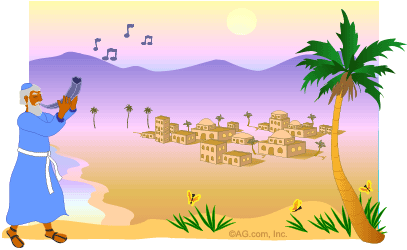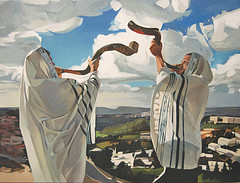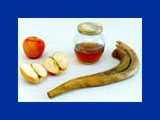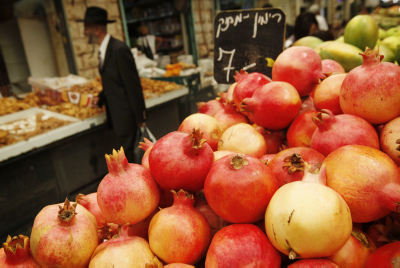
Rosh HaShana
Jewish New Year
September 29, 2008
Say to the Israelites: 'On the first day of the seventh month you are to have a day of rest,
a sacred assembly commemorated with trumpet blasts (actually Shofar).
Do no regular work, but present an offering made to the LORD by fire.'
Leviticus 23:24-25
On the first of Tishrei, the seventh month in the Jewish calendar, the Jewish New Year Rosh HaShana is being celebrated in September or the first days of October. It is celebrated for two days in the diaspora and for one day in Israel itself. The name translates "Head of the Year". Jews believe that God finished His creation on this very date.
It is the civil New Year. The religious New Year is in the spring month of Aviv (Nissan since Babylon). This dichotomization is a result of the Babylonian exile, which is recorded in the Babylonian Talmud. The celebration itself is mentioned in Leviticus 23:23-25 and Numeri 29:1-11 and is called Yom Teruah, the day of the Shofar blast.
The shofar is the horn of a ram that is being blown in remembrance of the planned sacrifice of Isaac which happily did not take place, because God gave Abraham a ram instead. This horn is being blown as a solemn recognition of God as King, Protector and Judge and is meant to generally stir up from a thoughtless life style. It calls up to reflection and is meant as a praise to God, the Creator.


Yet not only this - for us as believers in Yeshua, the shofar blast stands for the awaiting of the return of the Messiah:
For the Lord himself will come down from heaven, with a loud command,
with the voice of the archangel and with the trumpet call (it should really read Shofar) of God,
and the dead in Christ will rise first.
- 1 Thessalonians 4:16
Generally, God is being referred to as "King" (melech) in order to emphazise His authority. On Rosh HaShana, Jews and Messianics remember the story of Abraham and Isaac, which is expressed in "Akedat Yitzhak", the binding of Isaac, and is an example of the unconditional obedience toward the Creator. Abraham was willing to sacrifice his only son because God had demanded it (Genesis 22).
Here, we clearly see an indication of Yeshua's sacrifice: the obedience that God demanded of Abraham, yet did not enforce it, but demanded it of Himself by giving his very own Son in order to redeem man...
The 4 different sounds of how the shofar is to be blown at Rosh HaShanah -
Tekiah, Shvarim, Teruah und Tekiah Gedolah:
On Rosh HaHashana, Jews are greeting each other with the desire "May you be written and sealed for a Good Year" (the Book of Life) - "gmar chatima tova". This is to set high value on the reconciliation people (reconciliation with God takes place on Yom Kippur), who visit or contact each other by phone or email, making up for whatever strife they might have had in the past year. The "ten awesome days" ("Assereth Jemej Teschuwa") are beginning now and end at Yom Kippur, as indicated by God Himself in Leviticus 23:27.
It is a day of judgement that God is speaking over Jews and non Jews alike, which is being sealed on the last day of atonement. In this period between the first to the tenth of Tishrei, people have is the possibility to stocktaking of oneself, repentence and request for reconciliation. They ask God to forgive their sins during the past year.
A tradition illustrating the forgiveness is the "Tashlikh". Prior to the afternoon prayer of the first day of Rosh HaShanah, Jews take little stones in their pockets and throw them into a river or lake. This is to remind of God's promise to throw the sins into the depth of the sea and forget about them (Micah 7:19).

|
A solemn dinner is being initiated by igniting the candles and the blessing over wine and bread, the Kiddush at every meal on these days. Yet, instead of pouring salt on the bread, like it is usually done at the Kiddush, Jews on this evening will dip their bread into honey. Apples, too, belong to this feast and are also eaten with honey. This expresses hope for a "sweet" new year - "Shana tova umetucah". This is why honey cakes are also popular on this feast. |
| Also the pomegranate is of a big significance, especially at Rosh HaShana, since people desire to obey as many mitzwot (commandments) in the New Year as there are seeds in the pomegranate. It is said that there are 613 seeds, which is exactly the number of God's commandments in Torah! This is why the fruit is also a | 
|
Also for us believers in Yeshua, forgiveness is of a big importance, which is especially clear in the Lord's prayer. Yeshua Himself pointed this out in Matthew 6:9-13. So we, too, have good reason to celebrate Rosh HaShana and Yom Kippur! Yet we as believers in Yeshua have the certainty of that we don't have to do works in order to be written into the Book of Life. Our entry there does not depend on works - as the sacrifical Lamb, Yeshua has obtained an acting forgiveness for us which gives us an indelible entry if we give our lives to Yeshua, the Messiah! In memory of this we can celebrate Rosh haShana with big joy.
Shana towah umetukah!
- a good and sweet year! -